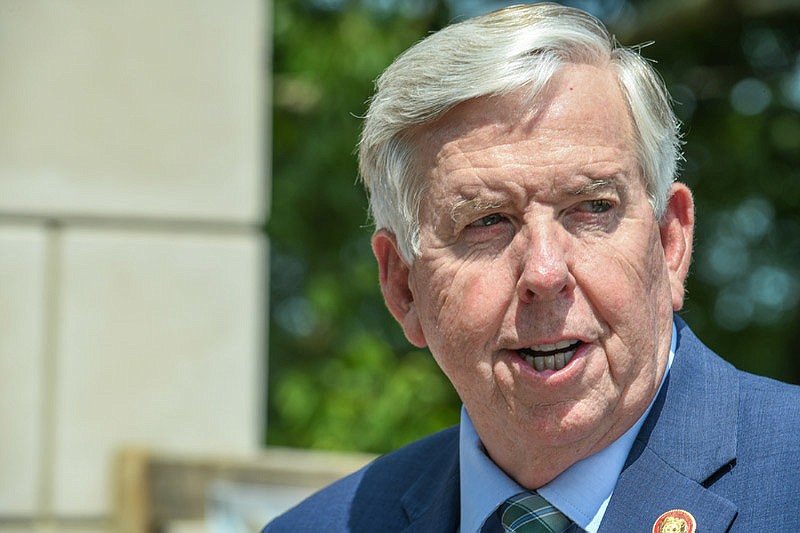ASHLAND, Mo. - As Missouri climbs out of the economic turmoil spurred by the COVID-19 pandemic, education, workforce development, and economic progress remain priorities for Gov. Mike Parson and community partners.
At the University of Missouri Extension Workforce Summit on Tuesday morning, Parson joined various industry representatives, educators and Ashland community leaders to talk about workforce development in Mid-Missouri.
Parson has made workforce development and infrastructure priorities throughout his time in office because he said they often impact other legislative areas and the daily life of Missourians.
Missouri is first in the nation for on-the-job training participants, Parson said, second for small business wage growth and third for apprenticeship programs and business tax index.
"People all across Missouri were expanding businesses all over the state every day to the tune of almost $2 million," Parson said. "In the middle of COVID, we were expanding businesses all across this state."
The governor said Missouri is eighth in the country for economic recovery and 10th in the United States for site selections, indicating more businesses are looking to operate in the state.
Missouri is prime real estate in the country, he said, and the state is looking to take advantage of that to continue developing infrastructure and the economy.
"Nobody's coming to this state if they don't feel like we got people here to work for them," Parson said. "And if you're not training them to work, they all look at that. They see what you're doing for the workforce of tomorrow."
In a similar vein, Parson is looking at education as a foundational way to shape Missouri's future.
No matter what the leading industries of the future are, Parson said, it all starts with training and K-12 education.
"We need doctors, we need engineers, we need architects, we need the health care institution as a whole, but the vast majority of young men and women are not going to go to college," Parson said. "But they're going to make up the workforce of tomorrow, whether that's IT, whether that's health care, whether that's construction or whether that's cybersecurity."
Parson said the state needs to prepare students to join the workforce and showcase what employment opportunities there are in Missouri, which begins in the classroom.
"If we don't figure out a way to get a kid in a classroom, and I don't care whether it's public, private, Christian, you name it, you got to get them in the classroom, and they have got to get an education," Parson said.
He pointed to the state's 102 Work Ready Communities as a way Missouri is preparing students to enter the workforce and attract economic development.
The 2019 Fast Track workforce incentive grant and the success of technical schools and career centers are additional ways the state is supporting workforce development, Parson said.
He said events like the summit help bring people together around a common vision.
"If we're going to be expanding the workforce of tomorrow, we're going to need to give young men and women the opportunity to realize what that is," Parson said.
Marshall Stewart, MU Extension vice chancellor, said MU Extension has aligned its efforts with the goals of Parson's administration and state lawmakers, and has been working to convene workforce development activities around the state.
"As the governor came out and said he wants all of us to be involved in workforce development and figure out ways to do it, we see a lot of space we can play in that," Stewart said.
Stewart used MU Extension's efforts to equip farmers with new skills and best practices as an example of ways it has contributed to workforce development in the past, and said that has since been expanded to small businesses, manufacturing and more.
In a 2016-17 study of the state, Stewart said, MU Extension found economic growth, bolstering education and supporting health care to be key issues it could help address across the state.
"Today, while thinking about that bigger picture, we're going to zero down on workforce development with our partners at Ranken and others," Stewart said.
Ranken Technical College is a private, not-for-profit college based in St. Louis.
It will have a satellite campus in the Central Missouri Workforce Development Center, a construction, medical services, information technology and industrial engineering technology training center opening in Ashland.
The center is a collaborative project between the city, Southern Boone County School District and the Mid-Missouri Regional Planning Commission that is expected to generate 163 jobs and about $9 million in private investment.
Stewart said he is excited about MU Extension's partnership with the community, but it'll be the city of Ashland and its community leaders leading the workforce development efforts.
Stewart said Ashland will need to consider its local economy, what its assets are and what potential challenges could be, to better grow its workforce.
"This is a community here coming together, figuring it out," Stewart said. "We're convening, we're your partner, but this is going to be because you decide what you need to do here."
Ashland has seen some major developments recently.
The town of less than 5,000 has seen an almost 55 percent increase in population since 2010 and has close to 700 homes under construction.
It recently received a Mainstreet USA grant to beautify its downtown area and invested $7 million toward a new sewer utility a couple years ago.
Additionally, Ranken Technical College is building a new campus in Ashland and several other developments, like the Baptist Homes of Ashland, Cartwright Business & Technology Park and Lakeside Ashland, are under way.
Fred Parry, summit moderator and owner of Parry and Associates, said some of the growth can be attributed to Ashland's schools attracting people from elsewhere.
"This is a community that is growing and growing big," he said.

